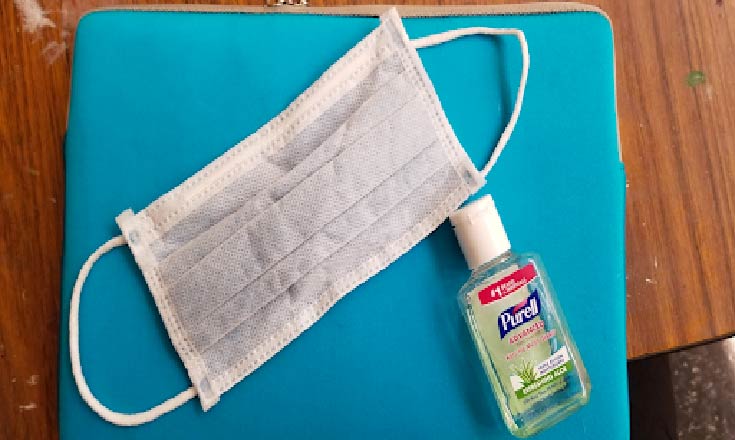
Photo Credit: Tiffany-Ashton Gatsby
Health Watch 2018
Written by Tiffany-Ashton Gatsby, 10/18/2018
The peak of this year’s flu season is rapidly approaching, anticipated to be in full swing by December. As the weather turns colder, the sniffles from your classmates are getting louder. There are several things you can do now to prepare yourself for the season, including making sure that you’re informed about the basics.
Influenza A or B, what we refer to as the flu, is a highly contagious viral infection that affects the respiratory system. While some cases of the flu are mild, if severe enough or left untreated, it can lead to death. Early signs of the flu may be as routine as a sore throat or a runny nose, but as the virus progresses, it can lead to a cough, body aches, chills, and extreme fatigue. Remember, not all cases of the flu come with a fever. Even if your body temperature is normal, you can still have the flu!
The flu is spread from person to person when an infected fluid escapes an infected person’s body. This happens when you cough or sneeze. The flu virus can also be spread to your hands if you wipe your nose or cover your cough with your hands. The virus is then easily transported to surfaces you touch, like doorknobs, desks and even your cell phone!
From your first exposure to the flu, you will usually see symptoms starting in a day or two. Remember that you can be contagious a day before you are symptomatic and you remain contagious for about a week. Everyone you come in contact with is then exposed to the virus, which is one of the reasons a flu outbreak spreads so quickly. The best thing you can do if you suspect you have the flu is to stay home. This is the first line of defense against spreading your illness on to others.
–Flu vaccinations are covered by most insurance, and if you are uninsured they’re very inexpensive.
Let’s be practical for a moment. We are college students and missing a day in class can sometimes have detrimental effects. If you decide to throw caution to the wind and attend class, make sure you’re doing your best to keep from spreading the illness to others.
- Cover your cough! Yes, this means wearing a mask. You can purchase medical masks at places like Walgreens, located right across the street from campus. You can even walk into most medical centers or urgent care facilities and grab a few for free. They want you covering your cough, your sneezes and your sniffles.
- Wash your hands! Every time you eat, sneeze, blow your nose, go to the bathroom or touch your face. Ok, that sounds like a lot of hand washing. If that just isn’t possible, then now is the time to go grab some hand sanitizing gel, like Purell. You can get small travel bottles for just a buck or two.
- Stop touching your face! Seriously, don’t touch your face. I’m not kidding. Any viruses or bacteria you touch will hang out on your hands for a while. Rub your eye, touch your lips or nose and it’s game over.
- Go to the doctor! What if it isn’t the flu? They can swab your nose and do a rapid flu test to see if you’ve caught the flu bug, or possibly something different. You can also develop complications from the flu, which include other infections like a sinus infection, bronchitis or pneumonia. Some of these infections could be bacterial, which means you’ll need an antibiotic to clear it up.
If you’re wondering what the number one way of avoiding the flu this season is, you may have already guessed it. That’s right, I’m talking about getting vaccinated. The flu vaccine is relatively safe for most populations, it works very well and is available all over town. You can get a flu vaccine at a local pharmacy, your doctor’s office and walk-in flu clinics set up in places like Virginia Mason, just down the street. Flu vaccinations are covered by most insurance, and if you are uninsured they’re very inexpensive. You could be saving yourself from some very pricey doctor visits later on by acting now and getting vaccinated. And while influenza antiviral medications are available, that’s bringing in the big guns and not typically used unless your flu is pretty severe.
There are two different types of flu vaccines available, so your fear of needles is not a good enough excuse to keep from getting a flu shot this year. There is a nasal spray available at most locations that contains a live version of the virus. Almost anyone can use this version of the vaccination unless you have certain medical conditions that suppress your immune system. Your doctor or pharmacist will be able to tell you if you’re a good candidate for the nasal spray vaccination.
–The simple flu could mean a hospital visit, lengthy recovery time and the potential for serious complications for people on campus in high-risk categories.
If you have actually stuck with me through all of this information, you may be asking yourself, “Why do I care? Everyone gets sick, anyway.” Well, you’re right. Everyone does get sick. However, we are in a large city and attending college with a large population of people from diverse backgrounds. Some of the diversity here on campus has to do with disability status and medical conditions. Several of your fellow students and teachers have disabilities. Some are visible, and some are not. Other students and teachers may have medical conditions or may be taking medications that weaken their immune systems, putting them at higher risk for contracting illnesses. The simple flu could mean a hospital visit, lengthy recovery time and the potential for serious complications for people on campus in high-risk categories.
Just a few examples of conditions and/or medications that may cause a weakened immune system:
- Cancer – if you know anyone with cancer, their immune system may be weakened from the illness or from medications and treatments like chemotherapy. There are several types of cancers out there. Not everyone will have visible signs or look sick, so you have no way of knowing who may be sick unless they disclose that personal information to you.
- HIV/AIDS – anyone with untreated HIV or acute AIDS may have a weakened immune system.
- Asthma – anyone with asthma is more susceptible to upper respiratory infections including complications from getting infected. While asthma medications like steroid inhalers can help keep your asthma in check, they can weaken your immune system.
- Immunosuppressant Medications – there are several conditions that require the use of immunosuppressants, including Multiple Sclerosis, rheumatoid arthritis, Grave’s Disease, lupus, psoriasis and inflammatory bowel disease, just to name a few. Many patients are treated with steroids when symptoms flare up, but could also be on daily medications that suppress the immune system at all times.
- Diabetes and heart disease may also lower your ability to fight off infection. And if you’re over 65 or under 5, or happen to be pregnant then you are also at higher risk.
Remember, if you are in a high-risk category you can carry a mask with you. Hear someone coughing? Put it on and keep yourself safer! Wash your hands as often as you can and use the hand sanitizer in the library. If you feel comfortable, you can let people know not to give you hugs or offer a sip of their coffee if they’re feeling under the weather.
–A small bit of personal inconvenience could literally be saving someone’s life.
Simply due to the size of the campus and the amount of faculty, staff and students here at any given time during the day, chances are you’re always coming into contact with people in the high-risk category. Assume that someone in your classroom may be getting really nervous when they hear you coughing in the corner. If you aren’t willing to take precautions for yourself, think about everyone else. A small bit of personal inconvenience could literally be saving someone’s life.
So be nice this season. Stay home when you’re sick, wash your hands and cover your cough!


